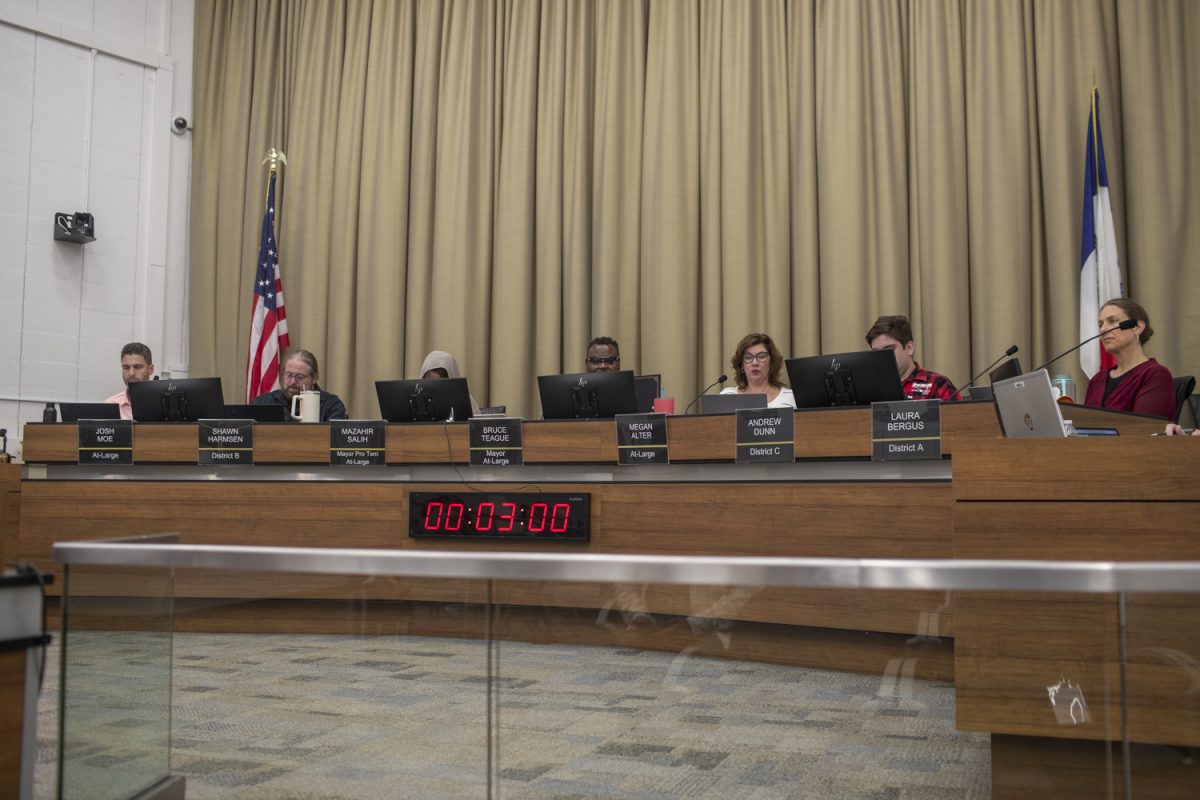The Iowa City City Council is discussing ways to improve collaboration and clarity among its four recurring grant programs.
At the Sept. 17 work session, Mayor Bruce Teague said there have been concerns raised about the city’s grant programs in the past, including that some organizations are receiving funding from several programs at once and that the same organizations are being funded repeatedly.
The four grant programs that are under review are the Aid to Agencies, Climate Action, Racial Equity and Social Justice, and Public Art programs.
Several councilors said they would also like the grants to have clearer language in the grant eligibility requirements. For example, Mayor Pro Tem Mazahir Salih said the Aid to Agencies program can be confusing because it has “legacy” and “emerging” funding pools, which are awarded at different times and have different applications.
The Aid to Agencies grant program aims to give nonprofit service agencies funding for their operations so they can serve low-income residents of Iowa City, according to meeting documents. Legacy applications occur every two years and have a more intensive application, while emerging applications occur yearly and are shorter, meeting documents state.
Clearer language would make it easier for commissioners to decide which organizations they should recommend receive funding, and it would make it easier for applicants to understand what projects are eligible for each program, councilors said.
The council will continue to review the grant requirements and processes — especially the Aid to Agencies program — in future work sessions.
CommUnity Crisis Services, an Iowa City-based nonprofit that provides mental health support and resources to the community, has been a recipient of several grants from the city in the last few years, according to meeting documents.
Emma Huntzinger, communications manager for the nonprofit, wrote in an email to The Daily Iowan that these grants have provided a reliable source of funding for the organization as well as an avenue to pursue special projects, such as a mural in the Gilbert Court neighborhood and culturally diverse foods for its food bank.
“Grants are all about finding alignment between what a funder wants to achieve and the nonprofit’s goals, so each of these grants was a great opportunity for CommUnity to meet our clients’ needs or improve their experience of our services while also supporting the plans the city has for climate action, social equity, and more,” Huntzinger wrote.
However, some concerns about the grant programs have been shared by organizations in past city council meetings. At the April 2 city council meeting, the Racial Equity and Social Justice grant allocations for fiscal 2024 were approved by the city council.
During public comment on this item, several members of Black Professionals of Iowa, a nonprofit organization that assists business professionals of color with connections and collaborations, expressed disappointment and frustration with not being chosen to receive the grant. The organization was created in October 2022.
“For an entire year, Black Professionals of Iowa has been at the forefront of driving meaningful change without any support from the city,” Tasha Lard, the organization’s executive director, said at the meeting. “Our efforts have been widely recognized and publicly visible, raising the question — why were organizations like ours overlooked for grants?”
The Racial Equity and Social Justice grant is given out every fiscal year and is aimed to fund nonprofits that “encourage, empower, and engage racial equity and social justice initiatives,” according to meeting documents. Doug Kollasch, chair of the Human Rights Commission, said the commission’s role in determining what organizations they recommend should receive funding is difficult.
RELATED: Grant rewards helps Iowa City organizations serve underrepresented communities
The commission can only award a total of $100,000 each cycle, which often means that organizations do not receive the full amount they applied for so the commission can try to fund as many nonprofits as possible, Kollasch said. There are also many organizations worthy of funding each application cycle, making the choice even harder, he said.
“It’s really difficult because there’s a lot of really good work going on in Iowa City, a lot of really deserving organizations,” Kollasch said.
The Human Rights Commission has made some changes to the way it chooses its grant recipients over the years. In the past, the commission used to review each application in hours-long discussions, Kollasch said. Now, the commission has a rubric and scoring system so commissioners can narrow down which organizations have the best, most fitting application, he said.
In the future, Kollasch said he would like to see a set of criteria on what to do in the case of repeat applicants, which is currently up to the discretion of the commission. He said he would also like to see a history of what organizations have received funding from the four grant programs so the commission can see where funding has overlapped.
“There’s not a whole lot of overlap between the four — I think there’s maybe ours and Aid to Agencies that overlap more — but where there is overlap so that we know it and other commissions know it to try to allocate that funding in a more balanced manner,” Kollasch said.



